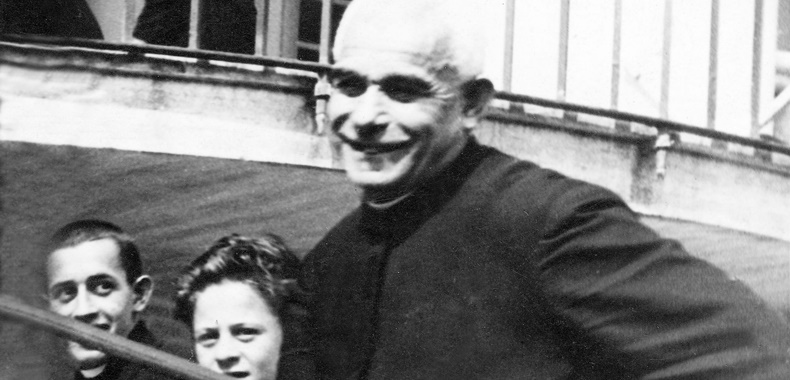THE CHARISM OF DON ORIONE: SOMETHING BEAUTIFUL IN THE CHURCH

Fr. Flavio Peloso interviews Saint Louis Orione
THE CHARISM OF DON ORIONE:
SOMETHING BEAUTIFUL IN THE CHURCH
From the book: DON ORIONE. INTERVISTA VERITA’,
by Fr Flavio Peloso, Ed. San Paolo, Cinisello Balsamo, 2004, pp. 25-31.
Question: Don Orione, you are a man about whom everybody is speaking. You are a big hearted priest. From you a miraculous work for the good of all came into being. Orphanages, colleges, parishes, seminaries, social centres, missions, “Little Cottolengo (Piccoli Cottolengo)” can now be found throughout Italy as well as abroad, in Brazil, Argentina, Uruguay, Poland, Palestine, Rhodes... How do you define your work?
Answer: I don’t know. I am tempted to call it a load of trouble ...; we keep going on like a train, puff puff, trusting in God and in his Church, certain that we are serving Christ in the most needy cases. For me, I think that the Lord chose me because he could not find anyone else on earth more wretched and incapable than I, so that it would appear clearly that it is he who does everything.
Q.: Yes, Don Orione, and this train of charity, between puffs and jolts, carries on speedily and beneficially. Everyone says: Don Orione, the Pope’s man and the Church’s man. Don Orione, the man for the poor and for those far from God. Pope - Poor: is this the track your train runs on?
A.: You see, that which is good is liked by everyone, even by those who are evil. We live in a century which is full of chill and death in the life of the spirit. Everything closed in on itself, nothing to be seen except pleasure, vanity and passion. Life on earth and nothing more. Only the breath of the charity of Jesus Christ can give life to this generation which is dead to the life of God. The face of the earth will be renewed by the heat of spring, but only the heat of charity can give new life to the world of morals.
We will have a great catholic renewal if we have great charity. The cause of Christ and of his Church make use only of great charity of life and works. Charity restores everything, edifies everything, unifies everything in Christ and in his Church.
Q.: Today, in pastoral programs, the indivisable ideas of “evangelisation and the witness of charity” are emphasized.
A.: Speeches have now become useless. Jesus demonstrated his heavenly doctrine by healing men and by the multiplication of bread. If we want to be believed and do good, we must heal people by generously sowing the love of God and of man and by multiplying the life of Christ in all humanity by works of charity and by sowing our life, even sacrificing ourselves so that Christ may live again in his divine Charity.
Q.: Let’s go back to you. Recently during a convention at the Catholic University of Milan on the theme of your social and ecclesial work, a scholar practically negated your apostolic originality: substantially you did not have an original project: you followed historical opportunities. You began with the boys and the school of San Bernardino in Tortona, then came the agricultural colonies, then the missions, then more recently more importance was given to charitable work in favour of orphans, the disabled, the elderly and marginalised of society. You confronted many diverse social and ecclesial problems: education, assistance, the world of work, the press, ecumenism, even the recovery of “lapsed” priests. With your Little Work you did everything and you want to do everything!
A.: I think I should say something which will overcome the objections made, or which may be made in the future, about the Institute for its universal nature in carrying out works of mercy and also something should be said about its uniqueness with regards to all the other religious Institutes, even though I feel that this is unnecessary. The objection that too many tasks have been taken on by this Work of Divine Providence rests on a false premise. The false premise is that this Institute intends to carry out every work of mercy without distinction and all at once. This is not true. The Institute has only one particular activity which it intends to do, and no other, and that is the sanctification of the members who make up the Institute, by the shedding of a sweet love for the Holy Father among the Christian People.
Q.: How do you say that the “means” - as long as they are works of charity for the poor - go well, while it is the “end” which better defines your charism in the Church.
A.: Our particular and special aim is to diffuse the doctrine and the love of Jesus Christ, of the Pope and of the Church, especially among the people: to lead and unite the sons of the people and the working classes with a sweet and tight bond of the mind and the heart to the Apostolic See, in which, according to the words of Crisologo, ‘Blessed Peter lives, presides and gives the truth of the Faith to whoever asks for it’. (Epist. Ad Eutic. 2). And all of this by means of the apostolate of charity among the least and the poor of the people, through those Institutions and Works of mercy most suitable for the Christian education and formation of the sons of the people and to guide the multitudes to Jesus Christ and his Church.
The means: today agriculture, tomorrow industry, then art, school, the press; but the aim: that is the love of God and of the Pope in the heart of the least, of the poor and of those afflicted with every sickness and pain. We defend the head of the Church and we will save the body.
Q.: Dear Father, you like to define your religious as the “Jesuits of the people”, because as Jesuits they must have the same passion for the unity of the Church with the Pope and the Bishops, but dedicating themselves above all else - exclusively - to the poor and the simple people.
A.: Yes. Our ideal is to be the porters of God and the Jesuits of the people. The Congregation is for the poor,only for the poorest of the poor. This I say and insist on so as to map out our itinerary. If this doesn’t come about it will become the desert around the Church. The Church has always cared for the poor and people believe that the Church is their stepmother. We must care for the sons of the workers, for the poor, for the abandoned. The Congregation is for these people, only for these.
The working people were, in part, seduced by ill-omened propaganda, by anti-Christian naturalistic and subversive theories, which drove them away and kept them increasingly in disharmony with the family and country... Some people sow darnel and poison souls; some work to make workers enemies of God and the Church... In the light of the risen Christ and under the leadership of its legitimate pastors, we must promote a powerful activity of Christian penetration especially among the people, we must work to bring back to Jesus Christ and to the Church the humble classes, the mass of workers, so completely surrounded.
Q.: You share this charismatic passion - to bring the least, the poor, the people to the Church and to the Pope, to ‘instaurare omnia in Christo’ , by means of works of charity - with the Little Work of Divine Providence, founded by you, and made up of religious, priests, hermits, active and contemplative sisters, lay people. Have you any particular recommendations for them that you would like to emphasize?
A.: I personally feel that soon I will go. It is up to you to maintain the Congregation and not allow it to lose the spirit of a life which is humble, poor, mortified and ardent with charity and sacrifice, which must animate it and make it prosper for the glory of God and his holy Church. You are the founders. I am nothing more than an older brother, called first in time by divine mercy; but you are the ones who keep the houses going, who give the Congregation its appearance. We must be an apostolic force in the world, a doctrinal force in defence of the Church, something new and beautiful! /I>
Would it not seem really useless that a new Congregation was formed in the Church of God, if it did not give greater glory to God, if it did not give us our sanctification, if it did not bring to the world a breath, I would say, both new and stronger, of the love of God and of men?



